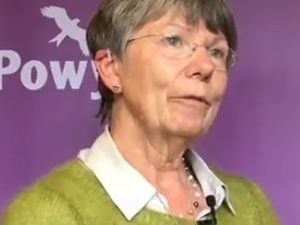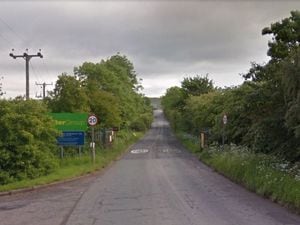MP welcomes government's water quality announcement as Shrewsbury residents keep up the pressure on river Severn pollution
Residents and politicians are continuing their campaigning for more to be done to clean up the River Severn.
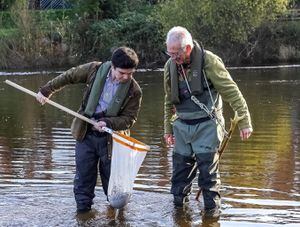
Residents from Shrewsbury recently joined officials at water company Severn Trent for a 'magical sewage tour' of the town, a councillor waded into the river to test the water and a county MP this week welcomed increased investment to improve storm overflow infrastructure.
Lib Dem councillor Alex Wagner waded in at Sydney Avenue, Castlefields on Sunday morning to take part in a riverfly sampling exercise.
Councillor Wagner said: “Our town is proudly nestled in the loop of the Severn, yet often our natural environment is not treated with the respect it deserves. I wanted to see the state of the Severn for myself, and so put on my waders to run some ‘kick sampling’ tests just down from the Weir at Castlefields.
“Cleaning up the Severn is going to be a huge task, requiring serious government and private investment. What has been made really clear to me is that improving our waterways and rivers is a must, and there is overwhelming public support to protect and nurture our natural environment.”
Dr Rob Park is a regular sampler on the Upper Severn and Reabrook. He said the lack of bugs is a sign of poor river quality.
“Residents of the town will have noticed the sometimes considerable hatch of Mayflies in late May and June. Unfortunately they will have noticed they don’t have to clean insects off their car windscreens like years ago .
“Riverfly sampling is done in Shrewsbury and now riverside chemical testing has also been added . No good news on water quality in what is often an open sewer running through our town.”
During a recent tour of the town's controversial combined sewer overflows (CSO) members of the Up Sewage Creek campaign group heard what Severn Trent is doing to tackle the issues of Shrewsbury's creaking old Victorian sewage system. When it rains heavily, rain water and water from the sewers can overflow into the river.
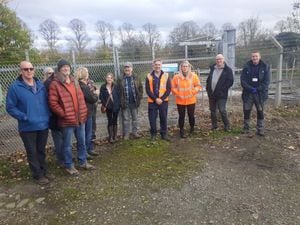
The group heard how if the system did not overflow it would mean homes would be flooded as it backs up. But to solve it all in one go would cost a vast amount of money and lead to Shrewsbury's roads having to be dug up.
Claire Kirby, of Up Sewage Creek, said: "The CSOs are now all monitored and we were able to see the technology which measures the level and sends live data to Severn Trent over the mobile phone network.
"It should be possible through better management now this system is in place to find blockages earlier and unblock them saving spillages.
"It would work well to have a campaign in conjunction with the water companies and all interested parties to ban wet wipes or at least to educate people."
She added: "Privatisation, pitiful investment, more housing, more paving and climate change have all played their part in this perfect storm of a pollution problem which threatens the life of our river and ultimately ourselves.
"I think we generally felt that the tour was imperative for us to understand the complexity of the situation and how it all practically works.
"From here we can be creative. We are very grateful to Severn Trent staff for showing us around and being so candid.
"The long and the short of it is that our river should never have been sold off to be managed or profit it is simply incompatible. We should never be sold down the river."
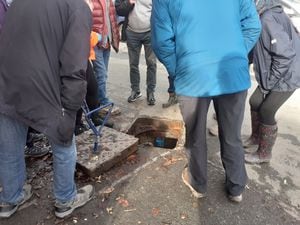
Ludlow MP Philip Dunne, who chairs the influential parliamentary Environmental Audit Committee, said he welcomed a Government announcement committing to a sewage reduction plan.
“After two and a half years campaigning on this issue, and a landmark committee inquiry, it is welcome news today to receive details of this sewage reduction plan which aims to leave the country's rivers and beaches cleaner and safer," he said.
"In its Water Quality in Rivers report in January, EAC called for a programme of long-term investment to limit the amount of surface rainwater entering the sewage system, which forces the dumping of untreated sewage into waterways.
“The headline £56bn of capital investment in water treatment over the next 25 years will more than double what has been spent annually since privatisation of the water sector."
He added that he hopes it will spell an end to the poisoning of river ecosystems and the harm done to bathers and other river users.
“The announcement that 100% of overflows will have monitors installed by next year is also good news. It is nevertheless crucial that the data provided by these devices is actively assessed by the Environment Agency and Ofwat, and that firm action is taken immediately if the data demonstrates that permit conditions have been breached," said Mr Dunne.
“As cost-of-living pressures increase, I also welcome the news that this investment from water companies will come at a cost to bill payers of just £1 extra per month for the first five years. Ofwat must use its powers and influence to ensure that the Government's strategic priorities are delivered by the sector through responsible re-investment of profits.
"It is also welcome that water companies’ dividend payments will be required to reflect environmental performance. A continued focus on water quality must be a priority issue in water company boardrooms during the sustained period of investment today's announcement heralds.
"The Committee will maintain a close watch on developments during this Parliament to ensure the Government remains on track to achieve its environmental objectives from this plan."

